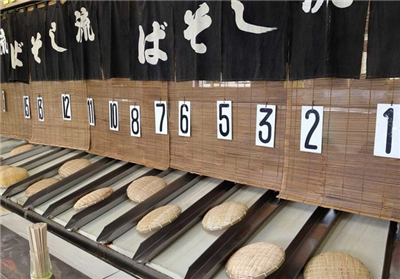Japan has a unique culture with a very strict code of etiquette.
日本有着独特的文化和严格的礼仪。
]There are specific ways to eat noodles, good practices for accepting gifts, and certain rules to follow to avoid insulting a host.
吃面条也有着特殊的方法,收礼物也要有好的方式,更别说要遵守一些规则避免侮辱招待你的人了。
This complex web of social rules and traditions can be overwhelming for those traveling to Japan, so we compiled a list of some of the things foreigners find most shocking when visiting the country.
这个复杂的社会规则和传统网可能会让一些刚来日本的人觉得倍受打击,所以我们制作了一个的表单囊括了那些会让外国人震惊的规则。
Here are 11 customs you should know before traveling to Japan.
这里是你去日本旅行之前需要知道的11项习俗。
1. No. 4 is avoided at all cost.

In Japan, the number "four" is avoided because it sounds very similar to the word for death. In the same vein as No. 13 in Western culture, No. 4 is extremely unlucky and is used as little as possible. You must always avoid giving anyone something in fours because it can be seen as a very ominous gift.
在日本,数字"4"因为听起来像"死"字所以被尽量避免。就像西方文化避免数字"13"一样,"4"代表着极端的不幸。你必须避免给别人"4"样的东西,因为它是不详的礼物,
Elevator labels will often be missing a fourth floor — and in extreme cases, they will not have floors 40 to 49. No. 49 is especially unlucky, as it sounds similar to the phrase that means "pain until death."
电梯标签经常会刻意忽略第4层,在极端的情况下,楼内不会有40到49的楼层。而49被认为是特别不幸运的,因为它听起来像"痛苦至死"。
The practice of avoiding No. 4 is called "Tetraphobia," and it is common in many East Asian and Southeast Asian regions.
避免"4"的习俗被称为"四的禁忌",这在很多东亚和东南亚地区十分常见。
2. Blowing your nose in public is considered rude.
在公共场所擤鼻子是十分粗鲁的行为。
Blowing your nose in public is seen as not only rude, but simply disgusting. Instead people will general ly sniffle until they find somewhere private. If you simply must blow your nose, it is recommended that y ou do so as discreetly as possible.
在公共场所擤鼻子不但会被认为十分粗鲁,还会让人觉得十分恶心。通常人们会吸着鼻涕直到找到一个私密的地方。如果你必须要擤鼻子,建议你做得越小心越好。
The Japanese are also repelled by the idea of a handkerchief.
曰本人也很抗拒手帕这种东西。













